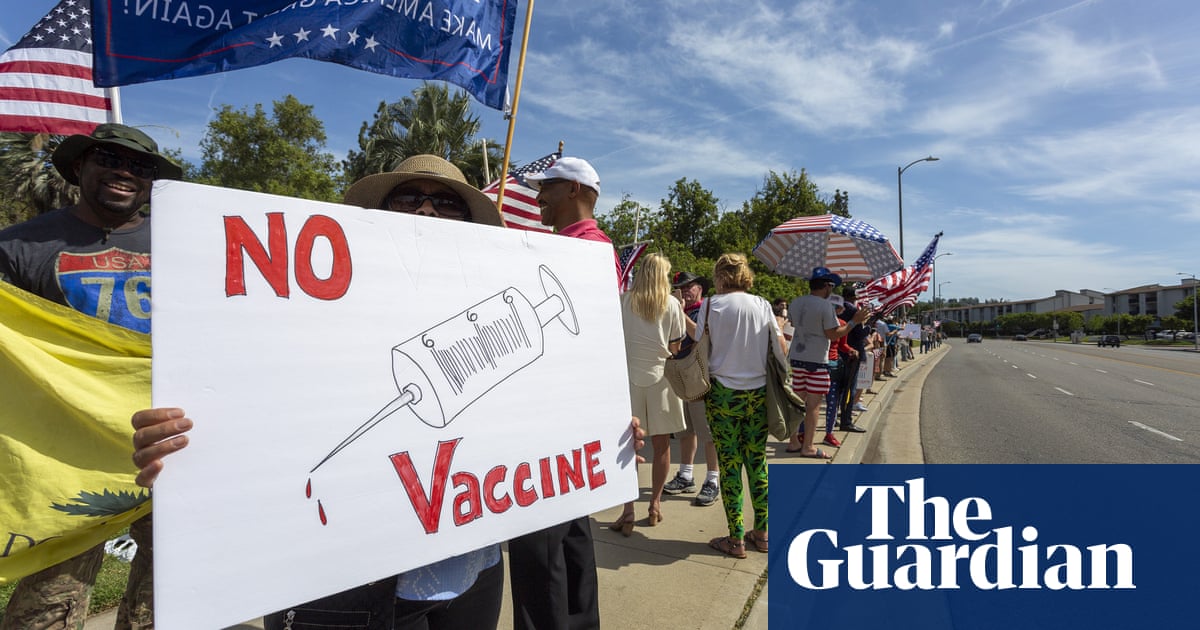US anti-vaxxers aim to spread fear over future coronavirus vaccine

A coronavirus vaccine may be a long way away, but there is already a threat on the horizon: anti-vaxxers.
Once a fringe presence in America, vaccine opponents have become better organized in recent years, a development that has contributed to the worst US measles outbreak in a generation in 2019.
Buoyed by their better organization anti-vaxxers have now taken aim at the very thing epidemiologists say can defeat the devastating coronavirus: an as yet undeveloped vaccine. Experts studying the movement warn anti-vaxxers influence and power could affect Americans’ willingness to take a Covid-19 vaccine and recent studies suggest this is a real issue.
In early May, a survey by two academics found that 23% of Americans would not be willing to get vaccinated against Covid-19. In a separate poll by Morning Consult, 14% said they wouldn’t get vaccinated, and another 22% were unsure. And according to a new Associated Press-NORC poll, only about half of Americans say they would get a Covid-19 vaccine if available. With more than 1.6m coronavirus cases in the US, and a more than 100,000 deaths, a mass refusal could have dangerous consequences.
Anti-vaxxers make up a small percentage of the US population, but just at the time when vaccines are most needed, they are thrusting themselves to the fore, especially on social media and in the growing movement to reopen an economy shutdown to fight the virus’ spread.
Opponents of vaccines have been ever-present at anti-stay at home protests in states across the country. They have pushed conspiracy theories ranging from the false idea that immunizations cause childhood illness, to the outrageous claim that Bill Gates is using vaccinations as a tool to microchip the world’s population.
Some of the apparent rise in anti-vaxx thinking can be attributed to Donald Trump’s blurring of fact and fiction, and questioning of science and officials from his own government.
Experts say social media has been a huge driving force too. Ideas that vaccines cause autism – a debunked theory still popular among anti-vaxxers – abound on Facebook, along with notions of governments and pharmaceutical companies collaborating to make money from duping regular people.
Like the protests against stay-at-home orders that anti-vaxxers joined at state houses, however, the anti-vaccine movement isn’t as organic and grassroots as it might seem.
On Facebook, the opposition to vaccines has been fueled by advertising paid for by two well-funded organizations; the Stop Mandatory Vaccination organization and Children’s Health Defense – led by Robert F Kennedy Jr, the son of Robert F Kennedy who has found a niche within the anti-vax movement.
Joe Pierre, a professor of psychiatry at the University of California, Los Angeles who writes on conspiracies and disinformation, said there are “psychological quirks” associated with a belief in conspiracy theories.
“One of those psychological quirks is a need for uniqueness,” Pierre said. “This is the idea that people who are attracted to conspiracy theories often feel like they stumbled upon some secret reality that the rest of us sheep – or sheeple, as conspiracy theorists like to refer to us – don’t know about. So there’s a certain sense of feeling special that you’re the privy to that information.”
With a potential coronavirus vaccine hopefully looming, two anti-vaccine activists held a “Freedom Health Summit” in April, inviting speakers to share information they were privy to.
The speakers list read like a who’s who of discredited scientists and conspiracy theorists, including disgraced Briton Andrew Wakefield, who was stripped of his medical license after he published a fraudulent study linking the measles, mumps and rubella vaccine to autism.
Despite Wakefield’s claims being disproven numerous times, he is seen as a reliable voice in the anti-vax movement, as is Judy Mikovits, a former scientific researcher popular among anti-vaccine supporters.
Like Wakefield, Mikovits has been disowned by the scientific community, but has sprung to broader fame since coronavirus began, thanks to her appearance in Plandemic, a disinformation film which was watched by millions when it was released in early May.
Mikovits, who claims – wrongly – that wearing face masks “activates” the coronavirus, was invited to speak at the Freedom Health Summit by organizers Stephanie Lind and Alana Newman, who spoke to the Guardian as part of a film on the anti-vaccine movement.
Anti-vaxxers aren’t exclusive to the US. In the past week reports have emerged of anti-vax being on the rise in Germany and Australia. Measles cases tripled in Europe in 2018, with Ukraine responsible for more than half the 83,000 cases, a rise spurred by anti-vaccine sentiment.
The US, however, has an outsized influence on anti-vaxxers worldwide.
“The US has the more vocal group of people out there – because it’s a very vocal society anyways, and [because it] has access to the vehicles of culture worldwide,” said Dr Saad Omer, an epidemiologist at Yale University.
“The discussions, even internal discussions that happened in the US are heard around the world,” he added.
In terms of thwarting the impact of anti-vaxxers, experts say the focus must be on winning over those who are less ardently anti-vaccine, who might only be dipping a toe into the hardcore anti-vax movement.
“If parents have questions, if they don’t go in this outlandish direction in those conspiracies, and they have concerns and they asked their physicians, that’s perfectly legitimate,” Omar said. He said the onus will be on health care providers and doctors to not treat the skeptics with contempt, but rather to answer people’s questions with respect.
“And to have communication approaches that are in line with those values of respect and, and not being patronizing,” Omer said.
“I sometimes say that if yelling at parents were a good idea, then teenagers would be the most efficient and effective communicators. That never works.”
*** This article has been archived for your research. The original version from The Guardian can be found
***


